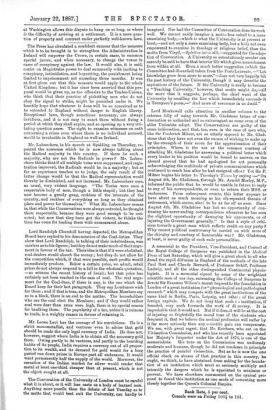Lord Randolph Churchill having departed, the Metropolitan Board have replied
to his denunciation of the Coal-duties. They show that Lord Randolph, in talking of their indebtedness, was careless as to his figures; but they do not make much of their argu- ment in favour of the tax. Their idea is that if it were abolished, coal-dealers would absorb the money ; but they do not allow for the competition which, if that were possible, such profits would immediately produce. Below a certain price, we admit, retail prices do not always respond to a fall in the wholesale quotation, —as witness the recent history of bread; but that price has certainly not been reached in the case of coal. The real argu- ment for the Coal-dues, if there is any, is the one which the Board keep for their last paragraph. They say Londoners wish for them ; and if that is true, and the Metropolitan Members say so in a block, there is an end to the matter. The householders who use the coal elect the Members ; and if they would rather coal were dear than rates were high, there is no special reason for baulking them. The popularity of a tax, unless it is ruinous to trade, is a weighty reason in favour of retaining it.


































 Previous page
Previous page